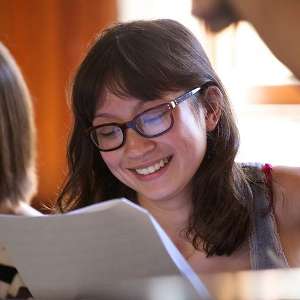Making their BBC Proms debut, it was difficult to know what to expect from the Chinese Philharmonic Orchestra. Formed in 2000, they are considerably newer than their European and American counterparts. They still have some way to go in finding their own sound, and their playing sometimes verges on the timid. It was only after the entrance of a charismatic soloist, in the form of pianist Haochen Zhang, was the orchestra able to come out of its shell.
The evening’s jumbled programme did nothing to aid matters. Elgar’s five-minute Pomp and Circumstance March no. 4 felt unnecessary, especially given the difficulty the CPO and their conductor, Long Yu, had with switching from the grandiosity of the March to the romanticism of Tchaikovsky’s Romeo and Juliet. Though Elgar opened with an immediately warm sound, Yu failed to escape the danger of march-music: falling into autopilot. It was the onward momentum of the march that kept it going, rather than the conductor. It resulted in a performance lacking in dynamic contrast, which failed to capture the excitement of the progressing march.
Yu was still in march-mode in Romeo and Juliet. His conducting was distracting: by giving every beat I could not escape counting along 1-2-3-4 in my head – not exactly what Tchaikovsky’s fluid opening demands. The winds were noticeably weak too. At the first arrival of the famous love-theme, they were unprepared with some issues in tuning. Instead of being a revelation, the love-theme was understated and nervous. Nevertheless, the orchestra improved as the work progressed. In subsequent statements of the love-theme, they succeeded in portraying the underlying tragedy in Shakespeare’s play. The performance had its lovely moments, but it lacked an overall sense of a journey. The love-theme should be an achievement, but Yu and the CPO seemed uncertain of where they were heading.
The entrance of the 24 year-old pianist, Haochen Zhang marked a turning point in the evening. His youthfulness was striking, and the stage looking too big for him, but the piano certainly was not. Zhang’s technique in Liszt’s Piano Concerto no. 1 in E flat major was flawless. His playing was effortless, without strain or tension. I had not realised what a pleasure (or relief) it would be to witness a soloist with whom I was confident that there would be no slips. Though Liszt demands a high level of virtuosity, Zhang avoided flamboyant gestures or distracting showmanship. His immaculate playing was enough. Liszt’s concerto is mostly a virtuosic showpiece, but the nocturne-like passage that opens the slow movement gave a glimpse at the pianist’s thoughtful side. His playing was delicate and considered: he was prepared to give every note its full expression. By the work’s finale, Zhang’s vibrant confidence had rubbed off onto the orchestra, as they finally began to revel in their own sound.
A UK première of a work by the Chinese composer Qigang Chen followed the interval. Joie éternelle takes a melody from traditional Chinese opera and gives it to solo trumpet, performed by Alison Balsom. I was uncertain during the opening half of the piece where Chen was going with it. Whilst the colourful orchestration was enchanting, the solo trumpet was hesitant and out of place. It acted passively, letting the orchestra carry it rather than enforcing a dramatic tension between itself and the orchestra. Yet the work evolved. As the music sped up, the trumpet gained a greater role, interacting with the orchestra more and with greater virtuosity. Perhaps this progression from stasis to action on the trumpet’s part was the point of the piece, but for me it took too long for it to get started.
Mussorgsky’s Pictures at an Exhibition gave the CPO an opportunity to display the diverse characters they are capable of. The piece portrays the promenading between pictures in a gallery and the various scenes that the pictures depict. Particularly striking was how Yu and the CPO could immediately switch between them. After the first promenade came a sharp change to the mischievous “Gnomus”. The solo saxophone captured the mysticism of the castle, then came playfulness in “Tuileries”, the plodding weight of cattle in “Bydło”, the hurrying hustle and bustle of the market place in “Limoges”, and the frightening witch in “Baba-Yaga”. With the last picture, “The Great Gate at Kiev”, we finally received a full, satisfying orchestral sound. Lu played expertly with expectations. Completely in control, he brought the orchestra back to quiet just as we were expecting climax. The final build-up was greatly anticipated, and was wonderful for it. Pulling out all excitement and exuberance from the work’s final chords, orchestra and conductor finally basked in their own pleasurable sound.


